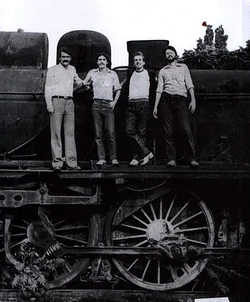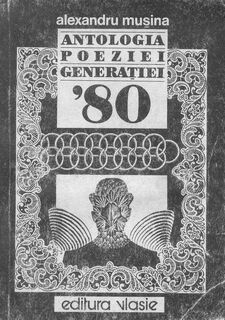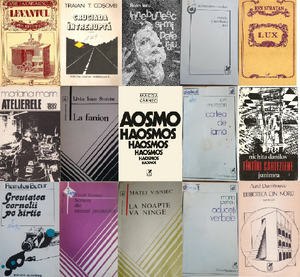
From left to right: Ion Stratan, Mircea Cărtărescu, Traian T. Coșovei and Florin Iaru (photo by Tudor Jebeleanu on the back cover of Aer cu diamante, 1981)
The 1980's generation, also nicknamed "the generation in blue jeans" (in Romanian: generația optzeci/optzecistă, generația în blugi) is the generation of Romanian writers of the 1980's. They were associated with textualism and especially postmodernism. Critics that have actively promoted this generation, such as Nicolae Manolescu, consider it an authentic neo-avantgarde and a revolution in Romanian literature, a significant step forward, even more so than neomodernism, while other critics, such as Marin Mincu, have argued that it is merely a step, albeit an important one, in the course of experimentalism, in which the writers have managed to (more or less) bring into the mainstream the innovations that had already been introduced by the likes of Leonid Dimov, Mircea Ivănescu or Mircea Horia Simionescu, eventually modifying the contents of the post-war canon. Frequently cited as "leader" of the 1980's generation is the poet and prose writer Mircea Cărtărescu.
Roots[]

The Anthology of 1980ist Poetry (by Alexandru Mușina, cover of first edition)
The writers of this generation have frequently cited as influences the American poets of the Beat generation, the Imagists, the Romanian and international avant-garde (Paul Eluard and Voronca are among the names mentioned in his early poems by Cărtărescu), the lost generation of Geo Dumitrescu and Constant Tonegaru, the aesthetic oneirists (especially Dimov), the Târgoviște School (M.H. Simionescu) and poets of the banal such as Mircea Ivănescu and Petre Stoica. They attempted to reject the metaphysical poetry of Nichita Stănescu (rooted in the - now considered obsolete - models of interwar modernism) and to bring poetry "in the street". However, the influence of Nichita is quite obvious, for instance, on some of the poems by Cărtărescu and Ion Stratan.
Later, after the 1980ists were repeatedly accused of not being genuine dissidents, writers of the 2000's generation have criticised the "artificial", "bookish", self-referential prose of textualist novelists and especially the "flamboyant", "unrealistic" poetry of Cărtărescu (that, for instance, would portray the desolant Bucharest of Communist era as a "second Las Vegas"). However, there are a few poets such as Romulus Bucur, Ion Mureșan, Mariana Marin or Elena Ștefoi who were/are cited among the favorite poets of the younger generation. Previously, writers such as Marius Ianuș were, in fact, in contact with Cărtărescu, who is a professor at the University of Bucharest. In any case, this generation did bring orality to the mainstream poetic discourse in a new way; more so than in the case of previous symbolists (Minulescu), avantgardists (Voronca's Ulise), oneirists (Dimov, Mazilescu) or poets of the banal (Mircea Ivănescu and Petre Stoica were acknowledged as important only after the 1980's generation reshaped the canon), the city and its daily life was a fundamental setting and a theme for the 1980ists, who changed the definition of what can be accepted in "high" poetry.

Vînt potrivit până la tare (cover of 2012 edition)
It is important to note though that there were a few German-Romanian writers (some of them grouped in Aktionsgruppe Banat) who, as early as the first half of the 1970's, who wrote in German radical poems that were challenging (including) from a political standpoint, texts that eventually were translated in Romanian, in the 1982 anthology Vînt potrivit pînă la tare ("Moderate to Strong Wind"). Reissued in 2012 in a complete, uncensored edition at Tracus Arte, the anthology was received well by the young Romanian poets (Mariana Marin even considered its release "the event" of 1982), but entered a cone of shadow before, apparently, being rediscovered by a few young poets of the younger generation, including V. Leac, who dedicated an article to it in Poesis Internațional and cited its title in one of his poems. The second edition was, however, done by one of the critics of the 1980's generation, Ion Bogdan Lefter, after several other collective volumes of this generation (Aer cu diamante, Cinci, Pauză de respirație) were also recently reissued.

Homer's Eyes (cover of 1977 edition)
The literary group of the early-to-mid '70s Noii (Mircea Nedelciu, Gheorghe Crăciun, Gheorghe Ene, Gheorghe Iova, Ioan Flora, Sorin Preda etc.) could be considered the first essnetial moment in the future development of the generation. Marin Mincu considers that the official "birth date" of textualism and the 1980's generation would be 1977, when the volume Ochii lui Homer (Homer's Eyes) by Petru Romoșan is released. Ion Zubașcu claims that the 1978 volume Întru totul by his sister, Ileana Zubașcu, could be considered the first volume of the new generation. Nevertheless, in the next few years, writers such as Traian T. Coșovei, Mircea Nedelciu, Ioana Ieronim, Denisa Comănescu, Mircea Cărtărescu, Florin Iaru, Liviu Ioan Stoiciu, Nichita Danilov etc. manage to release their individual books and make their mark. It is the 1981 collective volume, Aer cu diamante, that, by reuniting the core members of Cenaclul de Luni (Mircea Cărtărescu, Traian T. Coșovei, Florin Iaru, Ion Stratan - coordinator of the circle: Nicolae Manolescu), would establish the now-iconic image of the "generation in blue jeans".
Style[]

Various volumes by 1980ist poets (Mircea Cărtărescu, T.T. Coșovei, F. Iaru, Al. Mușina, Ion Stratan, Mariana Marin, L.I. Stoiciu, Magda Cârneci, Ion Mureșan, Nichita Danilov, Romulus Bucur, Viorel Mureșan, Matei Vișniec, Marta Petreu, Aurel Dumitrașcu)
Their style is usually characterized as "playful", "luxuriant", making use of irony and parody, postmodernist deconstructions, pastiches, allusions and references (most of them obscure at the time) to cult books and pop culture. Early on, they were criticised or applauded for their luxuriant imagism and frequent use of new and specialised terms, often with shock effect for mainstream readers (as the avant-garde was still considered irrelevant and not much studied). They have tried to promote other stylistic devices instead of metaphor. The prose writers were also shocking for taking advantage of the discoveries of semiotics and narratology; like in the anthology Desant '83, they employed experimental forms and often preferred short story (which they called for the first time "short prose"), reason for which they were initially considered "minor" and irrelevant (of course, the idea of "masterpiece" was and sometimes still is associated with monumental novels). Mircea Nedelciu, Gheorghe Crăciun, Mircea Cărtărescu and Ioan Groșan are now singled out as the most important prose writers of the generation.
This is the style established by core members, most of them of the Bucharest circle Cenaclul de Luni. However, especially in Transylvania (see echinoxism), but not only, there were countless other poets who employed irony to a lesser degree and, as Alexandru Mușina pointed out in Antologia poeziei generației '80, they were inclined towards metaphysics, while still using daily life and everyday reality as a starting point. Associated with this "serious" direction were especially Ion Mureșan, Nichita Danilov, Matei Vișniec, Marta Petreu, Ioan Moldovan, Aurel Pantea, Aurel Dumitrașcu, Dan Damaschin, George Vulturescu, Adrian Alui Gheorghe and others who brought new life to the influences of Blaga, Bacovia, neo-expressionism and neomodernism.
The social-orientated (but definitely not socialist) poems of Mariana Marin, the quasi-minimalism of Romulus Bucur and Elena Ștefoi, the textualist poems of Petru Romoșan, Gheorghe Iova, Bogdan Ghiu and Marin Mincu, the sci-fi poetry of Călin Vlasie, the mannerism of Viorel Mureșan are just few of the particular stylistic directions that can be identified further among the poets of the generation.

Several volumes of the 1980s by poets from previous generations (Gellu Naum, Nichita Stănescu, L. Dimov, Virgil MAzilescu, Ion Gheorghe, Angela Marinescu, Nora Iuga, M. Ivănescu, Petru M. Haș, George Almosnino, Șerban Foarță, Emil Brumaru, Florin Mugur, Aurel Rău)
There were quite a few poets from the previous generations who adopted some of the innovations popularised by 1980ists (in some of the following cases, they already had an experimentalist tendency): Angela Marinescu, Nora Iuga, George Almosnino, Emil Brumaru, Şerban Foarţă, Petru M. Haș, Petre Stoica, Florin Mugur, Constantin Abăluță, George Alboiu, Grișa Gherghei, Aurel Rău, Dinu Flămând, Adrian Popescu, Ioanid Romanescu, Anghel Dumbrăveanu, Florența Albu, Constanța Buzea etc. Even Nichita Stănescu's late output was in recent years associated with postmodernism. Unfortunately, the mainstream was stormed by the last remnants of socialist realism, as names such as Ion Crânguleanu and Petre Ghelmez and otherwise near-respectable poets indulge in homages to Ceaușescu. Until the late 1980's, fewer and fewer individual debuts are released and fewer volumes are published without suffering from drastic censorship. This is the context in which the next promotion (that of Nouăzeci magazine and the 1990's generation) will rise, a promotion that has been often annexed to the 1980's generation and indeed owes much to postmodernism, but which would also bring new poets and new features.
Writers associated with this generation[]
Poets[]
- Mircea Cărtărescu
- Traian T. Coșovei
- Florin Iaru
- Ion Stratan
- Alexandru Mușina
- Ion Mureșan
- Liviu Ioan Stoiciu
- Mariana Marin
- Bogdan Ghiu
- Magda Cârneci
- Marta Petreu
- Matei Vișniec
- Petru Romoșan
- Nichita Danilov
- Aurel Dumitrașcu
- Viorel Padina
- Denisa Comănescu
- Elena Ștefoi
- Viorel Mureșan
- Liviu Antonesei
- Simona Grazia-Dima
- Ioana Crăciunescu
- Lucian Vasiliu
- Ion Zubașcu
- Adrian Alui Gheorghe
- Călin Vlasie
- Eugen Suciu
- George Vulturescu
- Mircea Bârsilă
- Gellu Dorian
- Augustin Frățilă
- Dan Damaschin
- Paul Grigore
- Gabriel Chifu
- Ioan Morar
- Virgil Mihaiu
- Emil Hurezeanu
- Dan Stanciu
- Dumitru Chioaru
- Gheorghe Izbășescu
- Mariana Codruț
- Carmen Firan
- Ion Monoran
- Daniel Pișcu
- Octavian Soviany
- Cassian Maria Spiridon
- Aurelian Titu Dumitrescu
- Daniel Corbu
- Augustin Pop
- Gabriela Negreanu
- Nastasia Maniu
- Marcel Tolcea
- Ileana Zubașcu
- Romeo Cătuneanu
- Eugen Bunaru
- Nicolae Sava
- Ion Iovan
- Dan David
- Ion V. Strătescu
- Andrei Zanca
- Dan Giosu
- Lucian Strochi
See also 1990's generation and Romanian poets from Bessarabia (for postmodernists such as Emilian Galaicu-Păun).
Prose writers[]
- Mircea Nedelciu
- Gheorghe Crăciun
- Mircea Cărtărescu
- Ioan Groșan
- Sorin Preda
- Radu Țuculescu
- George Cușnarencu
- Alexandru Vlad
- Bedros Horasangian
- Adina Kenereș
- Olimpiu Nușfelean
- Ioan Lăcustă
- Gheorghe Ene
- Emil Paraschivoiu
- Ioan Mihai Cochinescu
- Nicolae Stan
- Constantin Stan
- Nicolae Iliescu
- Cristian Teodorescu
- Hanibal Stănciulescu
- Lucian Strochi
- Gabriel Gafița
- Marius Bădițescu
Critics[]
- Ion Bogdan Lefter
- Radu G. Țeposu
- Alexandru Cistelecan
- Radu Călin Cristea